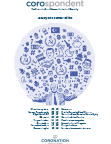
Frontier cement companies - January 2017
Six degrees of separation; I am sure you have heard of it. The idea that any person in the world can be connected to any other person in six or fewer steps. Coined by Hungarian author Frigyes Karinthy in 1929, this idea entered mainstream culture in the 1990s with John Guare’s play and subsequent film. The idea that we are all linked individually can also be applied to companies, especially in today’s globalised world. Expanding the Coronation Frontiers offering from being focused solely on Africa to include the other global frontier markets provides examples of many such connections and, I believe, makes us better investors as a result.
After many years of investing in African frontier markets, Coronation recently launched Coronation Global Frontiers, which includes countries in Southeast Asia, the Middle East, Eastern Europe and Latin America. Heading out across the globe in the lead-up to the launch of this new portfolio, I thought that it would be our eight years of experience investing in companies across Africa that would assist in analysing frontier businesses elsewhere. While this was certainly the case, I did not expect my experience in Pakistan to help me better analyse our African and even SA investments. We have seen examples in mobile money, banking and brewing, but in no sector has this connection been quite as apparent as in the cement industry.
PAKISTAN
One of our earlier investigative trips was to Pakistan. After visiting many companies across a variety of industries, we met with one of the large cement manufacturers, Lucky Cement (Lucky). Its management was impressive, focusing on a number of areas that we viewed as important, and the meeting was a good one. From our history of investing in Africa we knew cement companies well and two things in particular caught our eye. Firstly, Lucky’s energy costs and secondly, its plant location.
- Energy: In cement, energy costs make up a large proportion of total costs, as part of the production process involves the heating of limestone and clay to over 1 500 degrees Celsius. This is expensive and any saving in heating costs is a competitive advantage. What makes Lucky special is that it has optimised its plant to burn alternative fuels, such as old tyres or waste, that are cheaper than the coal or diesel used by its peers.
- Location: Lucky has two main production plants, one in the north of the country and a second in Karachi in the south. The Karachi plant is situated within the port, providing a very cheap and convenient route for overseas exports. This is another competitive advantage over its peers, who incur costs getting their cement to the port before they can export.
These two factors mean that Lucky is the lowest-cost producer in the market and very competitive globally. This cost advantage allows Lucky to export cement to many other markets – more on that later.
NIGERIA
Dangote Cement (Dangote) is the market-leading cement company in Nigeria. Dangote is a company we know well, both through a past investment in a key competitor and our current shareholding. About the same time as we were visiting Pakistan and meeting Lucky, Dangote was embarking on an ambitious expansion plan across Africa. The first phase saw cement plants built in Senegal and Cameroon as well as an investment in Sephaku, an SA company. Subsequent plants were opened in Ethiopia, Tanzania, Côte d’Ivoire, Zambia and the Congo. Like Lucky, Dangote can produce cement significantly cheaper than competitors and is often the low-cost producer in its respective markets.
SA
Dangote’s entry into SA in 2014 caused an immediate stir and the company rapidly established itself, taking a national market share of 15%. By leveraging plant efficiencies and then passing these savings on to the consumer, Dangote could charge lower prices than the incumbents, whose older plants were more expensive to run. Because Dangote’s plants are situated in the interior of the country, its market share was higher in Gauteng, as it is more expensive to send cement to the coast. This was further exacerbated by cheap Asian imports into the coastal regions around Durban.
Throughout the course of 2014 and early 2015, we began to hear complaints from SA cement manufacturers, including Dangote and Pretoria Portland Cement (PPC), about the ‘dumping’ of cement by Pakistani companies. One of the largest exporters to SA was in fact Lucky, the low-cost Pakistani cement producer we had recently met. We were thus able to leverage our exposure in global frontier markets like Pakistan, and our African experience in Nigeria, to deepen our understanding of the investment case for Dangote and the SA cement industry.
This connection of markets and companies has recurred numerous times since, whether it is PPC and Dangote with plants in Ethiopia, or Lucky and PPC in the Democratic Republic of the Congo. The benefits of knowing all of the affected companies, and of hearing both sides of the story, have been invaluable in helping us form our investment views.
More than just providing insight into the investment case for Dangote or Lucky, it has also helped us relook the investment case of their competitors. By avoiding investments in some of their competitors, we have escaped the occasional rights issue or two. The move into global frontier markets has improved the depth of our understanding of companies in our ‘home’ markets.
On an individual level, Facebook has been instrumental in driving down the number of steps needed to connect to any other person. Across their user base, the average number is now only 3.6 steps, down from 5.3 steps in 2008. In an increasingly globalised world, I have no doubt that the interconnectedness of markets and companies will continue to deepen in a similar way, even in the frontier parts of the world that one would not expect.
Coronation Global Frontiers is an institutional-only portfolio. Another institutional portfolio, Coronation Africa Frontiers, is managed by the same team and included as an underlying holding in our multi-asset funds such as Coronation Balanced Plus.
 South Africa - Personal
South Africa - Personal


